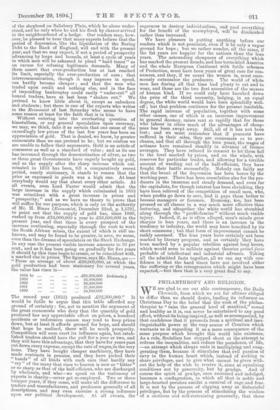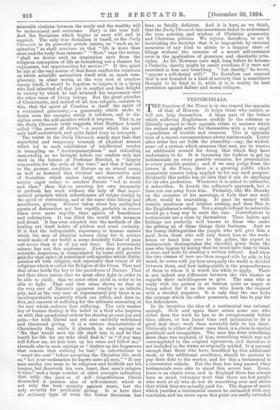PHILANTHROPY AND RELIGION.
WE are glad to see our able contemporary, the Daily Chronicle, from which we are far oftener obliged to differ than, we should desire, lending its influence on Christmas Day to the belief that the wish of the philan. thropist to "raise the general level of mankind," sound and healthy as it is, can never be entertained to any good effect, without its being inspired, as well as accompanied, by that confidence that it proceeds from a spiritual and inex- tinguishable power at the very, source of Creation which warrants us in regarding it as a mere consequence of the same purpose which brought this world into existence. As a, rule, Socialism has stopped short at the attempt to redress the inequalities, and reduce the paradoxes, of life, —an attempt which always ends in multiplying and exag- gerating them, because it stimulates that evil passion of envy in the human heart which, instead of seeking to share privileges, and to give what cannot be given with- out the help of the wish to receive it, aims at equalising conditions not by generosity, but by grudge. And of course the spirit of grudge, once exercised and indulged, becomes a conflagration, in which all that is noble and large-hearted perishes amidst a carnival of rage and fear. It is not by the process of clipping away at distasteful privileges, but by the process of stimulating the wisdom of a cautious and self-restraining generosity, that these miserable rivalries between the needy and the wealthy will be undermined and. overcome. Envy is the will hell. And the Socialism which begins in envy will end in anguish. The only true Socialism is based, as the Daily Chronicle in its powerful article insists, on "such an in- spiration" as shall convince us that "life is more than meat and the body than raiment." "How," says the writer, "shall we derive such an inspiration save from the religious conception of life as furnishing not a theatre for enjoyment, but opportunities for service P" If this spirit be not at the very source of that fierce conflict for existence en which scientific naturalists dwell with so much com- placency, in other words, at the very root of creative energy itself, it would be hopeless to inspire it in a be. ing who had inherited all that joy in conflict and that delight in victory by which he had attained his supremacy over the other races of living beings. But the great paradox of Christianity, and indeed of all true religion, cone.is.ts in this, that the spirit of Creation is itself the spirit of a restrained generosity,-.--a generosity which seeks to foster even the energies which it subdues, and to dis- cipline even the self-sacrifice which it inspires. That is, as the Daily Chronicle truly suggests, what Matthew Arnold. called "the secret of Jesus,"—a secret which the poet only half-understood, and quite failed. truly to interpret. The writer in the Daily Chronicle wisely says that that superficial and temporary triumph of physical science which led to such exhibitions of intellectual revelry in trampling on " Anthropomorphisra " and. ridiculing immortality, as we brought before our readers only last week in the lecture of Professor Haeckel, is "largely responsible for the evils of the time," and that it has led to the present condition of Europe as an armed. camp, as well as fostered that virulent and destructive sort of Socialism which makes large sections of human society eager rather to emulate Nature "red in tooth and claw," than Natare avowing her own incapacity to perform her work without the help of that super- natural principle which subordinates all vulgar rivalry to the spirit of restraining, and at the same time liberal and munificent, giving. Science taken alone has multiplied agents of destruction not less rapidly, probably in recent times even more rapidly, than agents of beneficence and redemption. It has filled the world with menaces and dread. It has even adopted into the methods of the healing art itself habits of pitiless and cruel curiosity. If it had the indisputable supremacy in human nature which the men of physical science claim for it, science would make of our world a scene decidedly fuller of pain and terror than it is of joy and hope. But fortunately science has not this supremacy. Every step it gains for scientific despotism, is compensated. by some still greater gain for that spirkt of restrained self-sacrifice which distin- guishes all true religion, and especially that truest of all religions which is called the Religion of the Cross. That and that alone holds the key to the paradoxes of Nature. That and that alone insists that we must often fight in order to be able to yield ; that we must often yield in order to be able to fight. That and that alone shows us that at the very core of Nature's apparent cruelty is an infinite pity, and at the very core of supernatural pity there is an inextinguishable austerity which can inflict, and. does in- flict, any amount of suffering for the ultimate annealing of the race which endures that suffering. The only master key of human destiny is the belief in a God who inspires us with this paradoxical ardour for sharing at once joy and pain,—for both liberal and, yet also carefully restrained and chastened giving. It is a curious characteristic of Christianity that while it abounds in such sayings as "He that would save his life shall lose it, and he that ioseth his life for my sake shall find it," or "if any man will follow me, let him take up his cross and follow me," abounds also in such sayings as "Gather up the fragments that remain that nothing be lost," in exhortations to "count the cost" before accepting the Christian life, such as," Let your moderation be known unto all men," "If any man among you seem to be religious and bridleth not his tongue, but deceiveth his own heart, that man's religion is vain," and a large number of other precepts indicating that with the pass'on of self - forgetfulness Christ demanded a passion also of self-restraint which is not only the best security against waste, but the only security for profitable giving. It is here that the ordinary type of even the better Socialism has been so fatally deficient. And it is here, as we think, that the Daily Chronicle has sometimes failed to understand the true sobriety and. wisdom of Christian generosity and Christian politics. We rejoice, therefore, to see it inculcating the doctrine that it is impossible by external measures of any kind to attain to a happier state of things without the exercise of a severe self-restraint even in the application of generous and. charitable prin- ciples. As Dr. Newman once said, long before he became a Catholic, charity might be easily overdone if it were not exercised in fear and trembling. "Let charity," he wrote, "appear a self-denial still." No Socialism can succeed that is not founded in a kind. of sobriety that is sometimes thought to be fatal to it, while it is in reality its best protection against failure and moral collapse.



































 Previous page
Previous page